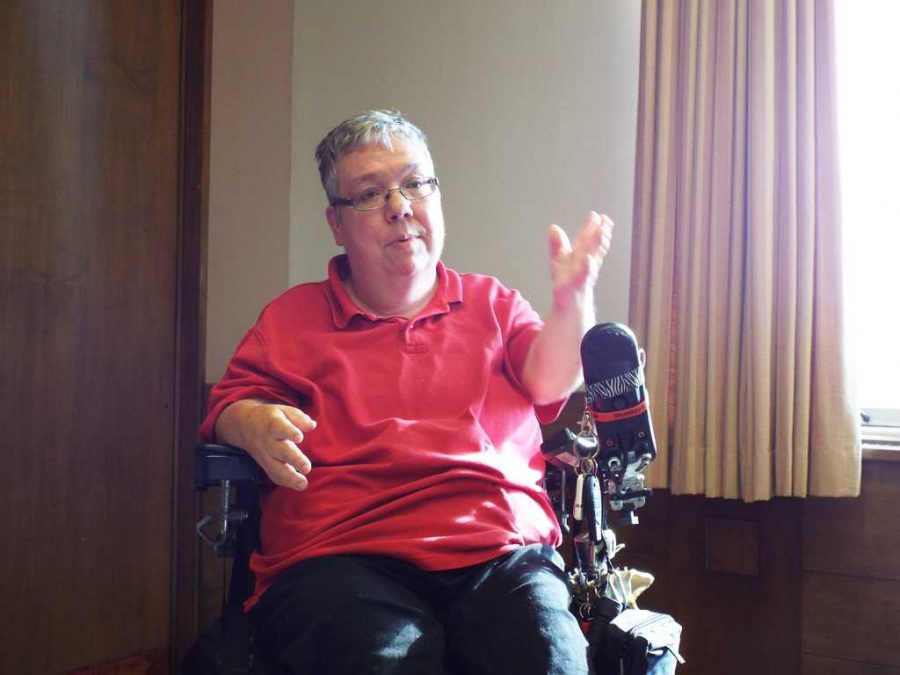A ride on the bus, a night out to dinner, a sexual encounter — while these things might seem mundane, Pitt students learned how difficult they can be for people with disabilities on Tuesday night.
Pitt’s gender, sexuality and women’s studies program hosted “All of me … All the time: An Honest Conversation on Gender, Sexuality and Disability,” from 4 to 5:30 p.m. Tuesday, Sept. 22, in room 1228 of the Cathedral of Learning.
The event featured lectures from Rev. Sally Jo Snyder, the director of advocacy and consumer engagement at the Consumer Health Coalition, and DJ Stemmler. Stemmler is a member of Accessible Oakland, a group that strives to improve the accessibility of Oakland buildings. She is also the office administrator for Pitt’s Graduate School of Public Health’s HIV Prevention and Care Project. About 60 Pitt students attended the event, according to event organizer Marie Skoczylas, a visiting instructor for Pitt’s gender, sexuality and women’s studies program.
Skoczylas said the lecture was meant to raise awareness about oppression and struggles for disabled individuals.
“The goal is to have equality for everyone,” Skoczylas said. “Regardless of our skin color, disabilities, sexuality, gender and so forth, we should all have equal access to resources and the ability to live fulfilling lives.”
In 1990, the U.S. government passed the Americans with Disabilities Act to make sure people with disabilities could live fulfilling lives. The act prohibits employers from discriminating against people with disabilities and requires buildings to comply with regulations accommodating those with disabilities, among other things. Stemmler was present when the bill was signed.
“It was a big deal,” Stemmler said.
Today, Stemmler thinks the federal government needs to do more to enforce the laws it puts in place. Oakland, in her opinion, needs a lot of work.
According to Oakland For All, an advocacy group for disabled people, only 11 percent of the businesses in Oakland have zero-step entrances, meaning that the majority of Oakland is inaccessible to those who cannot walk up stairs.
Stemmler said she would rate Oakland’s building and business accessibilities at a D and D-, respectively, based on her own scale.
Despite the inaccessibility of Oakland, all of the buildings on Pitt’s campus are accessible for people with disabilities, according to the Student Affairs website.
For Amanda Hopcroft, a junior psychology major, the statistics on the lack of accessibility in Oakland were the most shocking aspect of the lecture.
“I did not expect it to be that bad,” Hopcroft said. “It is astounding and disappointing to me that this is happening here, amidst so many education providers and medical experts.”
According to the speakers, one of the hardest parts about changing the public’s perception of disabilities is the lack of access to places for disabled individuals, which blocks off main routes to connect with people.
Snyder said one avenue for change is to stop avoiding education for people with disabilities, particularly those with mental disabilities.
“People with disabilities can be misled very easily,” Snyder said. “Parents are afraid of talking about it.”
To start the change, Snyder showed students a glimpse into the life of a person with disabilities by telling them the words that are often used to describe their community. The words highlighted included “invisible,” “ignored,” “incompatible” and “invalid.”
“If that is how the culture views you, good luck making that change,” Snyder said.
Snyder closed her lecture with encouragement for students to take the responsibility of improving rights for people with disabilities into their own hands.
“Students play a huge role,” Snyder said. “[Students] are going to shape the future and should be looking at the lack of accessibility for, visibility of and general education of disabled people.”


